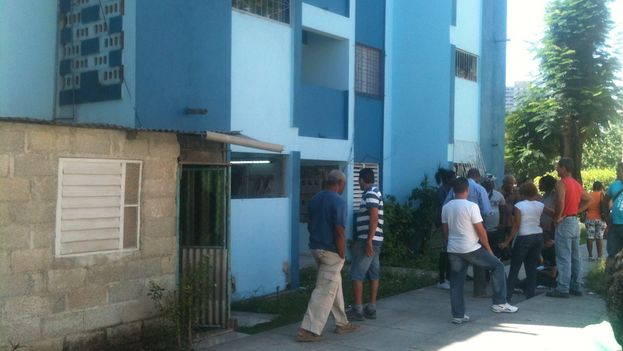
14ymedio, Havana, Luz Escobar, 26 August 2014 — Impotence and indignation has spread among residents of La Timba, in the Plaza de la Revolution municipality, one of the Havana neighborhoods affected by the Government’s war on architectural illegalities. For years, thousands of families with housing needs built additions their homes, took vacant land to expand them, or improvised makeshift parking spaces. A campaign by the authorities against this social indiscipline has put the spotlight on all these irregularities.
The Housing Institute inspectors, in cooperation with the police, travel the neighborhoods looking for these “illegalities” and, once they detect a violation, deliver an order to the homeowner to tear down every inch of the constructions put up without permission. The situation not only hurts those affected but puts the serious construction problem in the country at the center of the debate.
It is estimated that there is a deficit of over 700,000 homes in Cuba. In addition, 8.5 out of 10 existing dwellings need repairs. During the year 2013 only 25,634 units were built in the entire country, of which 47.7% were erected by the occupants’ own efforts.
Havana is one of the most seriously affected areas, and it is estimated that it would take about 28,000 new homes to ease the situation.
Jazmin, age is 57, is responsible for three teenage granddaughters. She lives in La Timba, at the bottom of 39th Street with her husband, who is about to turn 60. A few years ago, they added two square meters to their home by taking over part of the building’s common garden. Aware of the family problems that had pushed them to do so, none of the neighbors ever complained.
“We live with my husband’s brother and father. Both are alcoholics,” says Jazmin. “They’re good people but when they’re drunk they are completely transformed.” The problems of living together got more acute and, over time, the family felt forced to divide up the house. “We had to figure out this little piece to put a kitchen and a bathroom,” she explained, pointing toward a construction made from blocks and a light roof.
Jazmin decided to commit the architectural illegality after her husband, who worked in construction for three decades, asked for a house but they weren’t given it. The family’s economic hardship keeps them from buying a larger house or renting another space for the problematic relatives. “If they knock this down, we’re going to have defecate in a bucket,” she explains. But the time for herself ended with the collapse of the walls she built. This Monday the police and inspectors put an end to her “social indiscipline.”
“If they knock this done, we’re going to have defecate in a bucket.” A neighbor explains.
Her case is repeated all over the area. Maria and Juana are two elderly ladies, both over 80, who have surrounded their property with a barbed wire fence to protect themselves against the many robberies in La Timba neighborhood. They, also, were given only three days to dismantle the entire fence, but they’ve resisted doing it and now have legal documents to validate it. The Housing Institute, however, alleges that it was authorized by a prior law and by employees who no longer work for the State.
“What’s happening is they woke up pressured by someone from above and, as it’s easier to obey than to question, here they are,” as they say here, “following orders,” the older of the elderly ladies points out.
In the midst of the conversation Gladys appears, an impulsive neighbor who was also required to remove her fence and who shouted, at the top of her lungs, that she “didn’t feel like removing anything,” because the law says that every citizen has the right to protect their home. Furious, she accuses a neighbor of having built a parking space, sure of having permission because he works in military counter intelligence. “That didn’t go down well with me, I’m not stupid,” she says.
Tempers flare and the clock is ticking. In a few hours the inspectors will arrive.
